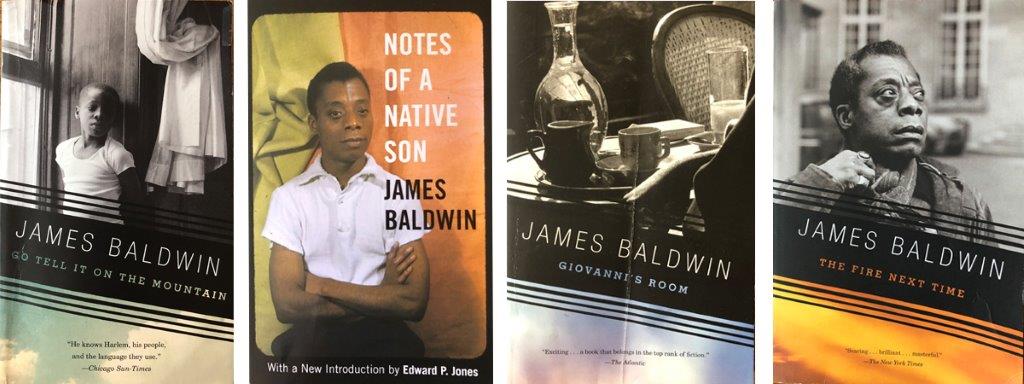
In 1948, with $40 and a profound desire to forge an identity free of the dehumanization he felt in the United States, 24-year-old James Baldwin bought a one-way ticket to Paris. “I didn’t know what was going to happen to me in France,” he said in a 1984 interview with The Paris Review, “but I knew what was going to happen to me in New York.” Baldwin’s acute understanding of racial inequality and abuse is what makes his writing pertinent today. But how did his experiences as an expat in Paris help him evolve as a writer and analyst of life in the United States?
Baldwin felt the burden of race and identity in America from the time he was a shy, but precocious child in Harlem. Born out of wedlock to Berdis Jones who bore eight more children when she married Reverend David Baldwin, James was humiliated, physically abused, and told repeatedly that he was ugly by the man he called father. Young James was aware of the boundaries set by white America and, indeed, the boundaries accepted by blacks. He recalls in The Fire Next Time, “the fear I heard in my father’s voice” when he realized that James believed he “could do anything a white boy could do.” Early on, however, teachers recognized his intelligence. One, Orwilla Miller, saw his devotion as a reader and talent as a writer. She convinced his reluctant stepfather, who deeply mistrusted whites, to let her take the 10-year-old to films and plays. Baldwin credits her with encouraging his intellectual development and they remained friends over the years. Orwilla called him Jimmy, as did friends and family all his life.
Baldwin probed race and identity relentlessly as an expat in Paris. In “The New Lost Generation,” an article in the July 11, 1961 Esquire Magazine, Baldwin attributes his decision to leave America to his recognition that attempts to deal with racism and inhumanity through political or social systems was a process that always led to “failure, elimination, and rejection.”
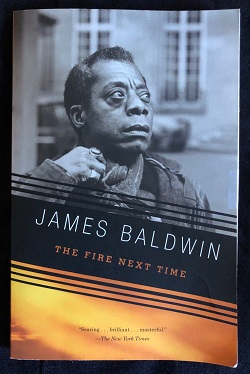 Considering realities such as the plight of blacks in the US, the Holocaust in Europe, and Hiroshima, he concluded that “all political systems . . . seemed morally bankrupt.” Dealing with issues of hate, intolerance, homophobia and alienation on a personal level was equally perilous as exemplified by the suicide of a close friend two years earlier who jumped from The George Washington Bridge in New York because of the relentless fear of living life as a black man in America. Considering the impossibility of ever attaining fulfillment as an ambitious, gay, black intellectual in the United States, Baldwin sought life in Paris to find the long heralded “refuge from American madness” that generations of artists and writers hoped to discover in the City of Light. More importantly, Baldwin wanted to explore and define his identity and “accept his own vision of the world”; this, he felt, was impossible for him in the United States of 1948.
Considering realities such as the plight of blacks in the US, the Holocaust in Europe, and Hiroshima, he concluded that “all political systems . . . seemed morally bankrupt.” Dealing with issues of hate, intolerance, homophobia and alienation on a personal level was equally perilous as exemplified by the suicide of a close friend two years earlier who jumped from The George Washington Bridge in New York because of the relentless fear of living life as a black man in America. Considering the impossibility of ever attaining fulfillment as an ambitious, gay, black intellectual in the United States, Baldwin sought life in Paris to find the long heralded “refuge from American madness” that generations of artists and writers hoped to discover in the City of Light. More importantly, Baldwin wanted to explore and define his identity and “accept his own vision of the world”; this, he felt, was impossible for him in the United States of 1948.
Baldwin did not find utopia in Paris—and he did not expect it. In his 1972 memoir, No Name in the Street, he states that “I had never, thank God—and certainly not once I found myself living there—been even remotely romantic about Paris”; in fact, he had considered going to Israel to live on a Kibbutz. His flight “had not been to Paris, but simply away from America.” He later recalls, however, feeling the lure of Paris when he studied French as a high school student in Harlem with poet Countee Cullen. He credits reading Balzac for his understanding of Parisian institutions and conventions, but upon arrival he came to grips with everyday realities of being poor in Paris directly. He remarks in Esquire that surviving meant “not expecting to be warm in one’s hotel room,” and in Notes of a Native Son that poor expats, Africans and students in the Latin Quarter lived in “ageless, sinister-looking hotels” and were forced to “continually choose between cigarettes and cheese for lunch.” There was nothing resembling an American toilet, and toilet paper was day-old newsprint. He admits to “moments” of longing for familiar American comforts and missing family, but when he thinks of what he so resolutely left behind in America, he chooses to adapt and continue his search for identity.
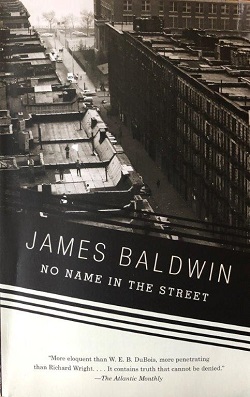 Baldwin was lonely at first and mourns that he and other poor expats were “surrounded by quite beautiful and sensual people, who did not, however, find us beautiful and sensual.” Parisians generally kept travelers “at an unmistakable arm’s length” even though comporting themselves with “impenetrable politesse.” He recalls that it was a long time before he made a French friend and even longer before he saw the inside of a French home. In the essay, “Encounter on the Seine,” from Notes of a Native Son, he states that “the American Negro in Paris is very nearly the invisible man” ignored not just by the French but by Americans in Paris. In an “undemocratic discrimination,” white Americans did not expect to see blacks in Paris. When they did, they assumed the Negro to be “a needy and deserving martyr or the soul of rhythm.” While meeting a white countryman in Paris did not evoke fear as it would in the US, it did not inspire a bond of community between compatriots abroad.
Baldwin was lonely at first and mourns that he and other poor expats were “surrounded by quite beautiful and sensual people, who did not, however, find us beautiful and sensual.” Parisians generally kept travelers “at an unmistakable arm’s length” even though comporting themselves with “impenetrable politesse.” He recalls that it was a long time before he made a French friend and even longer before he saw the inside of a French home. In the essay, “Encounter on the Seine,” from Notes of a Native Son, he states that “the American Negro in Paris is very nearly the invisible man” ignored not just by the French but by Americans in Paris. In an “undemocratic discrimination,” white Americans did not expect to see blacks in Paris. When they did, they assumed the Negro to be “a needy and deserving martyr or the soul of rhythm.” While meeting a white countryman in Paris did not evoke fear as it would in the US, it did not inspire a bond of community between compatriots abroad.
In Paris, Baldwin became aware of France’s problems with race from its colonial past. He affirms in “Encounter on the Seine” that the African in France has “endured privation, injustice, medieval cruelty” and exploitation in his native land. In addition, he cites the “intangibly precarious” existence the African has in Paris as a colonial desiring freedom for his country. But Baldwin also notes that this “bitter ambition is shared by his fellow colonials, with whom he has a common language.” When the African in Paris meets a fellow-countryman, there is camaraderie, unlike the “lifetime of conditioning” that often keeps the white American traveler at an uneasy distance from the black American. The African has “not yet endured the utter alienation of himself from his people and his past.” A salient difference for Baldwin is that the Africans had the solace of belonging to a culture, the possibility of a homeland and a people to which they could return. The American Black, in contrast, is a “hybrid,” with the “memory of the auction block” and alienation from his own homeland rooted in America’s violent racial past.
In No Name in the Street, Baldwin recounts that after returning from a visit to the US in 1952, he “began to realize that I could not find any of the Algerians I knew.” He discovers that “Algerians were being murdered in the streets, and corralled into prisons, and being dropped into the Seine, like flies,” awakening him to the fight for Algerian independence and the consequences for Algerians in France. He muses on the irony of his coming to France for “the comparative freedom of my life in Paris” as he witnesses the harassment and abuse of Algerians. Still, he recognizes a shared, violent history of colonialism and concludes that he “was still a part of Africa, even though I had been carried out of it nearly four hundred years before.”
In the video below, James Baldwin expresses some of this when asked about his relationship with Paris during an appearance before the National Press Club in Washington, D.C. on December 10, 1986, a year before his death from stomach cancer. Listen to the full three minutes of his answer. (After reading this article, consider returning to watch the entire 55-minute video for a sense of Baldwin’s point of view, the type of questions in the air at the time and their relationship with America and the world today.)
Despite his initial poverty, loneliness, and familiar encounters with prejudice, Baldwin came to love Paris and lived there on and off for the next nine years, returning to the city and its environs after time spent in places including Switzerland, Corsica, Turkey and several visits to the United States. Upon arrival in 1948, he connected with the editors of an avant-garde English language publication, Zero, who took him to the second floor of Les Deux Magots, a regular haunt of artists and intellectuals since the 1890s including James Joyce, Ernest Hemingway, Jean-Paul Sartre, Albert Camus and Picasso among others. Richard Wright, the celebrated American author of Native Son, who had long encouraged Baldwin in his writing, was there to greet him. That night Wright helped him find a room at Hôtel de Rome on Boulevard Saint-Michel. Despite the camaraderie between the two, the next year, Zero published Baldwin’s essay, “Everybody’s Protest Novel”—later part of Notes of a Native Son—rebuking literature that attempted to show the brutality of racism without a realistic representation of humanity. Richard Wright’s acclaimed Native Son was among the books chastised for the portrayal of its protagonist, Bigger Thomas, as someone whose “life is defined by his hatred and his fear” rather than in more complex ways. It caused a feud between the two that erupted publicly at Brasserie Lipp. Nevertheless, by 1950 Baldwin was hailed in Commentary Magazine as “the most promising Negro writer since Richard Wright.” They continued their relationship, somewhat tenuously after the outburst over the article, and Baldwin maintained his respect for Wright’s importance as a writer and influence throughout his life.
In James Baldwin, a Biography, Baldwin’s biographer, archivist and friend David Leeming states that once in Paris he eventually met some of his acquaintances from the lively Greenwich Village scene he had left in New York, and that before “long had no shortage of English-speaking friends in Paris.” He and other struggling writers and artists lived at the Hôtel Verneuil on rue de Verneuil in the 7th arrondissement. There he was part of a vibrant but impoverished group of men and women who shared rooms and friendship. He also found compassion in Mme Dumont, the Corsican woman who owned the hotel. Early in 1949, shortly after arriving in Paris, Baldwin fell ill. She exempted him from rent and cared for him for three months, allowing him to feel human kindness amidst the cool indifference of Paris. Leeming also notes that Baldwin “maintained non-Bohemian friendships as well” and eventually frequented the homes of “liberal, white, mostly Jewish middle-class Americans in Paris.” It was at dinner parties at these homes that he “met other American writers such as Saul Bellow and Phillip Roth.”
As he became integrated with life in Paris, Baldwin came to love walking through Les Halles, investigating the clubs and sex shops of Pigalle, and eating at Chez Inez, a jazz club and restaurant on Rue Champollion in the Latin Quarter specializing in fried chicken and emerging talent. Over time and with growing reputation, he met luminaries including Norman Mailer, Albert Camus, Simone de Beauvoir and Truman Capote. In 1953, artist Beauford Delaney, cited by biographer Leeming as “the most important influence in his life,” moved to Paris. A close friend and mentor from his Greenwich Village days, Baldwin credits Delaney for being “the exemplar of the black man as functioning, self-supporting artist.” Delaney eventually moved to “an old house surrounded by a garden in Clamart,” outside of Paris, which became a refuge for Baldwin for many years.
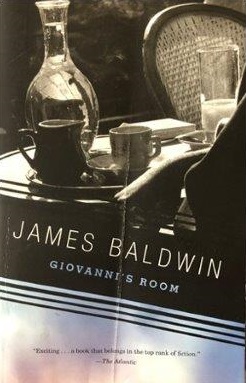 Despite his increasing comfort with life in Paris and the jobs he picked up reviewing books or writing articles, Baldwin struggled financially for years and often felt lonely. He took loans from friends and family, but it exacted a toll on his sense of self-worth. Once, Leeming notes, a desperate Baldwin “agreed to take a job as a singer in an Arab night club” until a friend “saved him from that job by employing him as a clerk.”
Despite his increasing comfort with life in Paris and the jobs he picked up reviewing books or writing articles, Baldwin struggled financially for years and often felt lonely. He took loans from friends and family, but it exacted a toll on his sense of self-worth. Once, Leeming notes, a desperate Baldwin “agreed to take a job as a singer in an Arab night club” until a friend “saved him from that job by employing him as a clerk.”
It was in Paris that James Baldwin finally became comfortable with his homosexuality and found love. According to his biographer, “Lucien Happersberger was a Swiss who had left home in search of excitement and success in Paris.” Baldwin declared that in Lucien he found “the love of my life.” They shared an intimacy for two years that was new to Baldwin. Their complex connection lasted in various iterations of lover and mostly friend for thirty-nine years. Baldwin wanted a permanence that Lucien did not; Lucien married three times and fathered two children. With Lucien, as well as in other relationships, Baldwin had experiences that would surface in Giovanni’s Room, his beautiful and tragic 1956 novel about a gay, white American in Paris who comes to terms with homosexuality, denial and brutality. The bar in the novel, Guillaume’s, is reported to be modeled after Reine Blanche and Fiacre, gay bars frequented by Baldwin in Paris.
A painful experience for Baldwin was his arrest and imprisonment in Paris for eight days over Christmas in 1949. A New York acquaintance, a traveler, spotted Baldwin in a café and decided to move from his hotel near Gare Saint-Lazare to the Grand Hôtel de Bac where Baldwin was living. It was a dismal lodging described in his biography as one of the “enormous, dark, cold, and hideous establishments” typical in those years. The man brought with him a sheet with the name of his previous hotel on it. Since Baldwin was having problems getting the hotel to change linens, it wound up on his bed. Two policemen came looking for the stolen sheet and found it. He and the acquaintance were charged and imprisoned until the 27th of December when the case was dismissed. The experience was frightening for someone new to the language, to handcuffs, to the putrid shed in which men were initially squeezed together with a hole in the center for a toilet, and to the isolation of a cell. One of the interesting observations about the ordeal that Baldwin relates in Notes of a Native Son is that “the Frenchmen in whose hands I found myself were no better or worse than their American counterparts”; under arrest he felt fear and the unknown as he would have in the States. But he also notes that in the “commissariat I was not a despised black man” as he might have been in America. In fact, he observes that in New York he would have been described as “what” he was—a black man. In Paris he was described as “who” he was—an American.
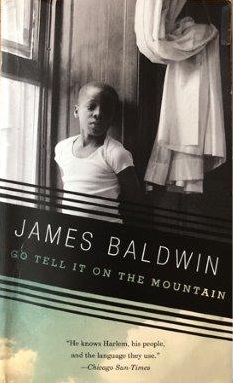 Over time, Baldwin began to concentrate on writing and, in doing so, to explore his vision of himself as a man and as an American. It was in Paris that he began to seriously develop his first novel, Go Tell It on the Mountain, setting up shop, like generations of writers seeking to escape their unheated rooms, on the second floor of Les Deux Magots and Café de Flore. Largely biographical, it recounts one day of a boy’s 14th year in Harlem where he awakens to the reality of racism, brutality within family and injustice on the streets and begins to pursue his own identity. The story had been incubating in Baldwin for years; it confronted his own history within family and in the racial divide of New York. It was published by Knopf in 1952 while he was visiting family in New York for three months. When he returned to Paris, Baldwin arrived with the resources so lacking when he first saw Paris in 1948. Following its publication, he won a Guggenheim fellowship and in 1956 he published Giovanni’s Room which is set in both Paris and the south of France. The novel was written mostly in France but not only in Paris. Baldwin also wrote essays in his early years in Paris that would become part of Notes of a Native Son.
Over time, Baldwin began to concentrate on writing and, in doing so, to explore his vision of himself as a man and as an American. It was in Paris that he began to seriously develop his first novel, Go Tell It on the Mountain, setting up shop, like generations of writers seeking to escape their unheated rooms, on the second floor of Les Deux Magots and Café de Flore. Largely biographical, it recounts one day of a boy’s 14th year in Harlem where he awakens to the reality of racism, brutality within family and injustice on the streets and begins to pursue his own identity. The story had been incubating in Baldwin for years; it confronted his own history within family and in the racial divide of New York. It was published by Knopf in 1952 while he was visiting family in New York for three months. When he returned to Paris, Baldwin arrived with the resources so lacking when he first saw Paris in 1948. Following its publication, he won a Guggenheim fellowship and in 1956 he published Giovanni’s Room which is set in both Paris and the south of France. The novel was written mostly in France but not only in Paris. Baldwin also wrote essays in his early years in Paris that would become part of Notes of a Native Son.
In writing Go Tell It on the Mountain, James Baldwin was able to begin unlocking the identity he longed to discover and define when he first left New York. Leeming points to its “theme of the destructive fear and guilt at the base of racism.” This would be explored by Baldwin throughout his life’s work. By writing much of the text in Paris, he was—like so many writers in the past—able to look to look back to America with a new clarity through the lens of an observer. He had the freedom to be a writer and live without the fear and impenetrable barriers he felt in New York. His biography notes that in his “Paris years he never lost sight of his need to confront his ‘inheritance’ as an American black in order to achieve his ‘birthright’ as a man.” In 1955, in his introduction to Notes of a Native Son, Baldwin declares that “I love America more than any other country in the world, and, exactly for this reason, I insist on the right to criticize her perpetually.”
Baldwin spoke no French when he arrived in 1948, but he did eventually become fluent, as you can hear in this extract from a 1973 interview in French.
Baldwin never idealized Paris or saw it through the “charm of legend” as he referenced the appeal it had for so many Americans; however, he believed that his life “began during that first year in Paris.” Baldwin returned to America for a time during the height of the Civil Rights struggle of the 1960s. He traveled the country as a writer as well as an activist. He came to see first-hand the American South where so much violence was taking place. He met with leaders such as Martin Luther King Jr., James Meredith and Thurgood Marshall and took part in the March on Washington in August 1963. He also raised support for the march from expats in Paris.
In 1962 he published The Fire Next Time, his seminal compilation of two essays that warn about white America’s need to confront and examine the reality of historic and systemic racism. It brought him international fame. In it he describes the “rope, fire, torture, castration, infanticide, rape, death, and humiliation” of “the Negro’s past” in America. He decries that blacks still feel “fear by day and night” and “doubt that [they are] worthy of life.” It is also a text, however, that concludes with the interesting and hopeful metaphor that “relatively conscious whites and the relatively conscious blacks” must “like lovers, insist on, or create, the consciousness of the others.”
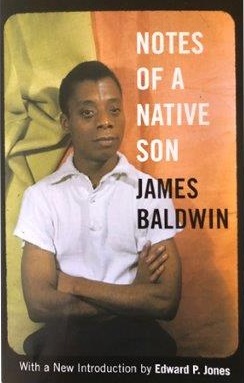 Once more, Baldwin left America. He traveled to Africa, Israel, Turkey, England, Switzerland and America again over the years, returning to Paris frequently but declaring himself to be a traveler rather than belonging to any country. (He also referred to himself as a “commuter” between France and the United States.) Leeming reveals that while visiting Paris in 1958, Baldwin “realized that he had changed a great deal in the years since his first arrival in Paris. Paris was no longer home, but it had been an important place in his life.” Later, after more travel and living in Turkey for a few years, Baldwin returned to France in 1970, this time to the south. For the last seventeen years of his life Baldwin spent a large part of every year in Saint-Paul-de-Vence. His home there became a refuge for his thoughts and writing, as well as a magnet for writers, artists, and intellectuals including Marc Chagall, Ella Fitzgerald, Yves Montand, Harry Belafonte, Nina Simone and others.
Once more, Baldwin left America. He traveled to Africa, Israel, Turkey, England, Switzerland and America again over the years, returning to Paris frequently but declaring himself to be a traveler rather than belonging to any country. (He also referred to himself as a “commuter” between France and the United States.) Leeming reveals that while visiting Paris in 1958, Baldwin “realized that he had changed a great deal in the years since his first arrival in Paris. Paris was no longer home, but it had been an important place in his life.” Later, after more travel and living in Turkey for a few years, Baldwin returned to France in 1970, this time to the south. For the last seventeen years of his life Baldwin spent a large part of every year in Saint-Paul-de-Vence. His home there became a refuge for his thoughts and writing, as well as a magnet for writers, artists, and intellectuals including Marc Chagall, Ella Fitzgerald, Yves Montand, Harry Belafonte, Nina Simone and others.
Baldwin’s need to explore race and identity and to define his life as a writer was pivotal in his decision to leave America in 1948, and he reflects on his decision to come to Paris in the 1961 Esquire article. “I think my exile saved my life, for it inexorably confirmed something which Americans appear to have difficulty accepting. Which is simply, that a man is not a man until he is able and willing to accept his own vision of the world, no matter how radically this vision departs from that of others.” He adds that Paris and Europe gave him “the sanction, if one can accept it, to become oneself. No artist can survive without this acceptance.”
© 2020, Elizabeth Esris
First published on France Revisited, October 2020.


Great article about the greatest American writer ever.
I am reading and digesting in sections while interspersing readings from Abolition For The People 2020.
Thank you for your kind comment. James Baldwin’s voice was truthful then and essential now. His story is an inspiration.
What a fantastic article. I’m new to James Baldwin and his writing. Very interesting about how he notices the French treatment of the Algerians. Thank you so much.
James Baldwin is worth discovering at any point in life. The more you read of his work or commentary about him, the more there is to learn and respect. This is a time to confront what he wanted us all to see–the truth of the past in order to make a more perfect future. That is true for America, France, and all countries. Thanks so much for reading!
Very much enjoyed reading this, thank you. I have yet to read anything of James Baldwin but will now for sure!
Your journey into his work will enlighten and reward you. Thank you!